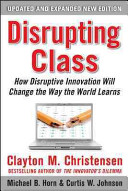DISRUPTING CLASS: THE FUTURE OF EDUCATION
/ We’re told that we need to change the way we support education. For the last few years I’ve included the following statement in my syllabi: “Keep in mind that the faculty role is facilitator. You are expected to take responsibility for your learning. Reflect on what you do and don't know. We have a structured syllabus with a starter set of readings and a book. Some assignments will point to specific readings or other resources; other assignments will expect you to do additional research on your own or with your team and classmates.” Great statement, but I’m not sure all the students are on-board.
We’re told that we need to change the way we support education. For the last few years I’ve included the following statement in my syllabi: “Keep in mind that the faculty role is facilitator. You are expected to take responsibility for your learning. Reflect on what you do and don't know. We have a structured syllabus with a starter set of readings and a book. Some assignments will point to specific readings or other resources; other assignments will expect you to do additional research on your own or with your team and classmates.” Great statement, but I’m not sure all the students are on-board.
This is a two (at least) part post. Today is just background. First off, let me thank Padma Nagaraja and her teammates in my Organizational Design course for the motivation. These are students who are on-board for changing learning for all of us. (Padma is a co-founder of Acceledge, described below). I’ll open with three descriptions from sources focused on a new age of learning:
- Acceledge "provides content and platform infrastructure to support a variety of needs of teachers, parents, instructors, clubs, organizations, societies, associations, freelancers & for all who want to teach, learn, collaborate & communicate.... Whether you are a student working through a school curriculum or a home schooler, whether you need additional help in some areas or are seeking to develop skills that give you an edge, Acceledge is committed to providing organic content in subjects of interest. Our courses give the students an opportunity to acquire new skills, develop new interests, venture into non traditional areas to test what captures their interest. The courses are built and identified by levels starting from beginning, and intermediate to advanced levels, which reaches the audience from elementary to college level and adults."
- The Khan Academy "is all about using video to explain the world, so what better way to explain the Khan Academy than through videos....[From the FAQ] Why are you doing this project? I [Sal Kahn] can't imagine a better use of my (or anyone's) time.... With just a computer and a pen-tablet-mouse, one can educate the world! Even better, the content never goes old. My (or your) great-great-great grandchildren could learn from the very same videos!"
- Disrupting Class: How Disruptive Innovation will Change the Way the World Learns (Christensen, Horn, & Johnson, 2008): "...But to move to full student-centric learning, we will need to incubate many of these technologies outside the K–12 public education system. Disruption and student-centric technology must first solve important problems outside the traditional classroom before they transform learning in schools. In so doing, they will, over time, likely fashion an entirely new commercial system in education."
Each of these three organizations sees a need to provide education outside of standard classroom settings. Each of the organizations takes a very open view of the term student -- elementary to life-long learner. My question of the day then is how we can engage students who would benefit and how can we help them learn to learn in these modes? How can we use our systems savvy to help us understand how to mix together technology tools and organizational practice in a way that supports today's learners? I asked three colleagues with educational technology backgrounds for their thoughts and references and will provide their answers as they come in. Feel free to add your own suggestions below.







